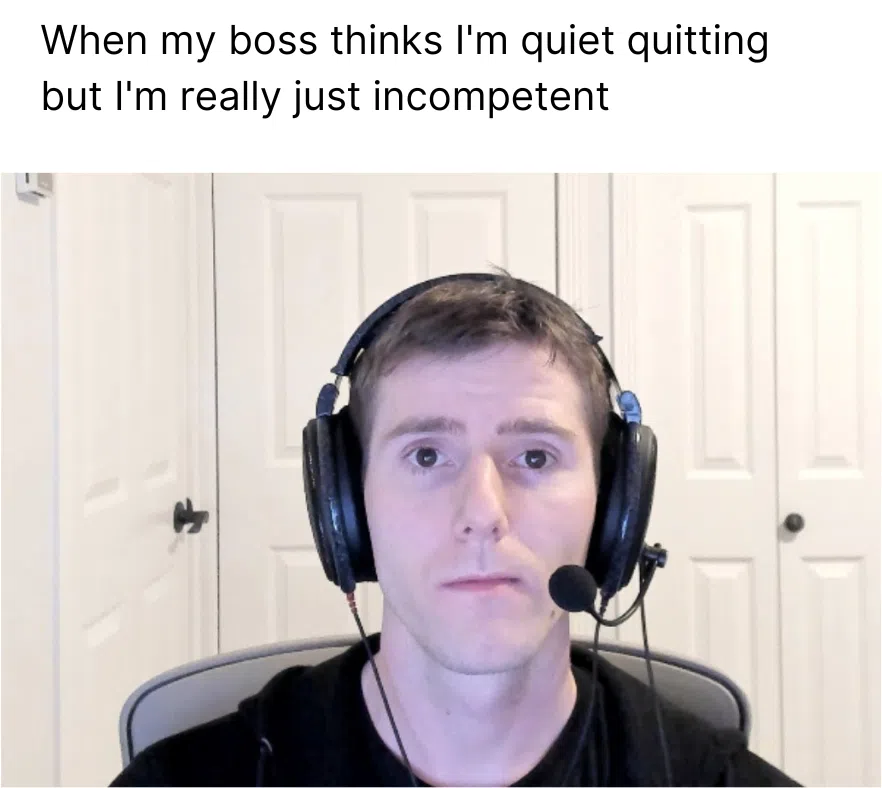👊 Grindset is out, quiet quitting is in

- Find out more and sign up for Thrive at bt.sg/thrive
⛔ Not going above and beyond
In August 2022, Zaid Khan, a 24-year-old engineer in New York, introduced the concept of quiet quitting to the world on – you guessed it – TikTok. “You’re not outright quitting your job, you’re quitting the idea of going above and beyond,” he explains.
Rather than working late on a Friday night or volunteering for extra work, the quiet quitter does what their job description says, and nothing more.
Quiet quitting has been described as a rejection of hustle culture - a work ethic that valorises working long hours with little regard for self-care, made popular by the likes of US entrepreneur Gary Vee.
Experts have also noted the pandemic’s effect on attitudes towards work.
“The search for meaning has become far more apparent,” Maria Kordowicz, an associate professor of organisational behaviour at the University of Nottingham, tells The Guardian. “There was a sense of our own mortality during the pandemic, something quite existential around people thinking ‘What should work mean for me?’”

To some, quiet quitting is just working. To critics, it’s just another brand for slacking – though many would argue that the movement isn’t about encouraging people to be lazy, just reminding them not to work to the point of burnout.
Navigate Asia in
a new global order
Get the insights delivered to your inbox.
Regardless of where you stand, doing the bare minimum at work is a novel concept for many who grew up being told that they should give their all at work. In corporate Singapore, it’s especially true when working overtime is more a norm than an exception.
A survey last year by job portal Indeed found that more than half (55 per cent) of Gen Z respondents said they were planning to quiet quit their jobs, citing salary dissatisfaction and burnout.
“Our survey identifies how workers in Singapore want to limit the pressure from work in their lives,” says Nishita Lalvani, Indeed’s marketing director for India and South-east Asia. “They are not saying they don’t want to work hard. They are just stressing the limits and the desire to have a better life-work balance.”
🥱 Are you just disengaged?
One positive perspective on quiet quitting is the idea of setting healthy boundaries at work. There’s nothing inherently wrong with the practice of just meeting your responsibilities if you’re still able to deliver quality work and meet your boss’ expectations.
However, playing a game of how-little-work-can-I-do-without-my-manager-noticing can be harmful to your career, especially if your reason for quiet quitting is to silently protest or get back at your employer.
Sure, quiet quitting is more often than not about bad bosses, not bad employees. The Harvard Business Review found as much when it looked at data showing that the least effective managers have three to four times as many workers under them who were quietly quitting compared with the most effective leaders.
But if you’re finding yourself unmotivated and disengaged from work, there are alternative steps you can consider taking before resorting to quiet quitting.
Tackling burnout: Wanting to say no to more work could be a sign that you’re burnt out. When you’re feeling overwhelmed, quiet quitting can be a coping mechanism to regain control of the sources of stress and anxiety that you’re facing at your job. But it’s not a long-term solution and it may be better to work out what’s causing your burnout and find ways to manage stress, or seek mental health support.
Talking it out: If you’ve silently checked out at work, whatever’s making you unhappy at work is not going to change for the better on its own. Schedule a chat with your manager and let them know about your needs and challenges. Whether you think you’re overworked or underappreciated, give your employer the chance to remedy the situation so you won’t have to resort to quiet quitting.
Take ownership of your career growth: Quiet quitting as a way to get back at your employer often stems from bitterness or resentment – emotions you don’t want to feel every time you think about work. If you want to grow your career, figure out the cause of your unhappiness. Are you disengaged at your workplace? Do you feel like your career growth is stagnating?

Before deciding to quiet quit, recognise that it may hurt your career more than if you took steps to address whatever misgivings you have at work. Even if your conversation with your boss doesn’t pan out well, that could be a nudge for you to start looking for opportunities in a more suitable organisation where you don’t dread showing up for work.
TL;DR
- Quiet quitting has been seen as a rejection of the hustle culture
- To some, it’s about just doing their job – nothing more, nothing less
- But this can hurt one’s career, if done for the wrong reasons
- Chat with your supervisor and let them know what your needs and challenges are
- It’s also on you to take ownership of your own career growth
Copyright SPH Media. All rights reserved.